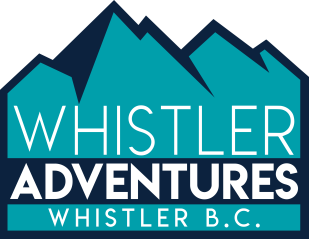Explore Whistler: Ski and Snowboard Edition
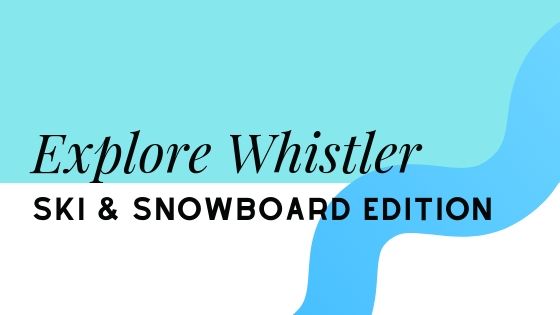
Whistler Blackcomb mountains are what every skier and snowboarder dream of. In fact, they are the kind of mountains that everyone dreams of (you just may not know it yet!).
Whistler truly ticks all the boxes as far as ski resorts go for skiing and snowboarding.
- A long season of snow ✓
- Acres upon acres of skiable terrain ✓
- Out of this world views ✓
- An apres-ski scene to suit all ✓
- Plenty of non-skier activities ✓
- Previous Olympic Games host ✓
- Big snowfall ✓
- Pro mountain ski guides ✓
…..Honestly, this list could go on but you get the gist.
If you’ve ever skied or snowboarded before or even thought about giving it a go, then a trip to Whistler is well worth it.
Whether it be your first time or your tenth time to this beautiful town, we’ve put together your Whistler ski guide, to help you suss it all out.
Top 5 Reasons to Ski and Snowboard in Whistler
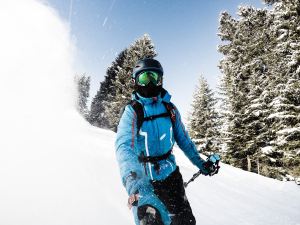
What are you waiting for? Make your spiritual journey to the land of pow
Other than being able to brag to everyone that you’ve skied Whistler, here are our top 5 reasons:
-
Ski and Snowboard Mecca
Whistler attracts thousands of visitors every year. From pro skiers and snowboarders to the absolute beginners who want to get out on the snow for the first time. This town is a ski and snowboard mecca. It’s designed for a large capacity
It’s made to be easy and everyone likes an easy holiday.
Accommodation is plentiful from luxury to budget – some with ski in ski out capability, ski storage and a ski concierge to assist you with everything mountain-related. Transport is simple, with free shuttles from main hotels, free buses between the main village and upper village and daily buses running from Vancouver to Whistler.
There is a large variety of specialty ski and snowboard shops for anything you may need (or may have forgotten) and tuning stores to get your gear in top shape before you hit the slopes.
Apres-ski in Whistler is also something everyone needs to get amongst, but that’s a story of its own. Check out You’ve Skied Whistler, Now What? Best Apres Activities.
-
World-Class Ski Resort
Picture this: 8,171 acres of skiable terrain, over 200 trails, 36 lifts, a gondola that connects Whistler and Blackcomb (that’s right – ski both mountains on the same day!), 16 alpine bowls, 3 glaciers, world-class terrain parks and a combined hourly lift capacity just shy of 70,000.
It’s easy to understand why Whistler is a world-class ski resort.
Whistler’s winter season generally runs from November 28 to April 19, with spring skiing going through till mid-May. This gives you just over six months of ski time and the snowfall is big, really big. The average snowfall over winter is ten metres or more, so you certainly won’t be short of the pow.
For first-timers, there is a world-class ski school, with some of the best instructors from all over the world. Even if you’re pretty advanced, there is always room for improvement and Whistler is certainly the place to take a lesson and brush up on some skills.
-
Terrain for All Abilities
The beauty of Whistler is there truly is terrain for everyone. For those who are popping their ski or snowboard cherry, there are learning areas on both mountains. This includes magic carpets to help sore legs get back up to the top of the hill and chairs that go at a slower pace so you can nail the whole getting-on-getting-off part.
For those more advanced the runs vary from greens to blues, blacks to double black diamonds, chutes, steeps, glades and alpine bowls. Runs as long as 11kms, parks on both mountains and if that’s not enough – then maybe it’s time for you to give the world-class backcountry a shot. Which leads us to our next point…
-
Backcountry Access
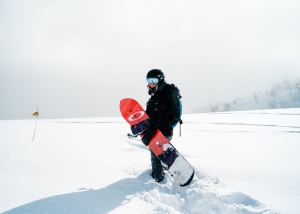
Secret stashes are not hard to find with a ski or snowboard guide.
Once you’ve skied all of the skiable terrain Whistler has to offer, what’s next? Lucky for you the show doesn’t end there. Outside of Whistler Blackcomb’s boundary line is a playground that knows no limits. Think big mountain, fresh tracks, no chairlifts, no lines and make-your-own trails.
Whistler Backcountry Ski Tours open up a whole new world and is something every experienced skiers or snowboarders must do in their lifetime.
Imagine 432,000 acres of big mountain terrain, including 173 glaciers and 475 runs… the best part? You get there via helicopter, so not only will you have the most incredible day of your life shredding untouched powder but you’ll also experience awe-inspiring views and a backcountry pro to take you on a guided tour.
This terrain isn’t for the faint-hearted and being alongside a professional who knows the area and can carry the necessary backcountry tools is going to make it the best experience possible for you. Don’t miss out on the best times of your life, because you don’t have a Whistler Ski Guide.
-
World Ski & Snowboard Festival
Whistler is home to the world’s largest annual celebration of snow sports, music, film, arts and mountain culture at the World Ski and Snowboard Festival.
The festival takes place every year in April and brings avid skiers and snowboarders to Whistler by the bucket full. From amateurs to world-class pros, everyone who’s anyone in mountain culture is around town.
The events are awe inspiring from the big air jumps to the slush cup, the swatch 72-hour filmmaker showdown to the pro photographer showdown, the halfpipe fam jam to the race extreme, the outdoor concert series to after dark DJs – there is something for everyone to enjoy.
Why a Whistler Ski Guide Makes the Difference
Having a mountain ski or snowboard guide is always going to benefit you. These guides not only live and breathe their sport but the Whistler Blackcomb mountains, which they call home.
Here’s why we think a guide is the best idea:
- Local Knowledge
There’s a high chance you may get lost on the mountain, or find yourself on a run a little out of your league. Having a guide who knows the mountains like the back of the hand is always going to be a good idea. The guides live local and they know the weather and mountain conditions, where to go and where not to go. Once they have an idea of what skill level and ability you have, they’ll be able to tailor the day to you. It’s almost guaranteed a guide will take you to the best runs that you never would have stumbled across yourself.
- Safety First
Skiing and Snowboarding are extreme sports and it’s important to know the correct way to safely participate in them. Not only is this for your safety, but the safety of those around you. Guides can give you pointers on mountain etiquette, teach you safe ways to fall and ways to try and eliminate injury to yourself and others. They’ll also make sure you have all the right gear and everything fits as it should.
- Fundamental Skills
No matter what level you’re at, there is always room for improvement. Guides will make sure your stance, posture and body placement is correct. They’ll study your technique and break you out of any bad habits you may have picked up along the way. And most importantly they’ll provide you with new skills to help progression.
- Find Your Run
Guides are patient and a wealth of knowledge. Your day may start slow as you and your guide get into the groove of things (you showing them what you’re made of – them figuring out your capability). BUT as soon as that groove is found, a guide is going to challenge your capability and before you know it you’ll be on double blacks!
Never Been Skiing or Snowboarding Before? What You Need to Know
So you’ve never been skiing or snowboarding before? First things first you need to decide which discipline you’re going to go with – they say that skiing is easier to learn, but harder to master and that snowboarding is harder to learn, but easier to master. So with that in mind, make your decision… If you’re on a short trip perhaps skiing would be the best way to go, to cover more ground. If you’re sticking around for longer, then give snowboarding a go, all the cool kids are doing it.
What Should I Wear?
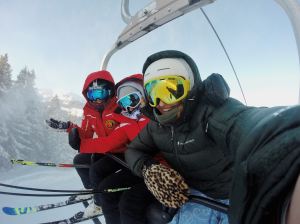
Dress for success. Safety first, Steeze second.
For beginners getting the clothing, balance can always be a mission. Layers take time to master, but it doesn’t take long to figure out how many you need. We’ve made a list of the most important items you need to wear, as well as our recommended layer options:
- Helmet: this is a no brainer, a helmet is a must for both disciplines. When you fall, you’re going to want to protect your head.
- Goggles: may not always be needed, but it’s always recommended to have them with you as the weather can change at the blink of an eye.
- Thermals (base layer): if you think it’s cold in the village, wait till you get up to the alpine – thermals are a great first layer.
- Jumper or T-Shirt (middle layer): base this on the weather conditions for a cold day you can get away with a t-shirt over thermals, for a freezing day you’re going to want a jumper over the top of that t-shirt and maybe even more.
- Ski Jacket (top layer): snow is wet and you’re going to want to keep dry. A gore-tex jacket is going to be the best way to go, it’s the best rain-proof material around.
- Ski pants or bib (top layer): this one is the same as above here guys, you need to stay dry – especially your legs. Gore-tex is again, a great option.
- Mitts or gloves: there is nothing worse than cold hands unless it’s frozen hands and if you fall with no gloves on, you’re going to have cold and wet fingers.
- Merino wool socks: keep those tootsies dry and warm, ski and snowboard boots aren’t the comfiest either – so the thicker the better.
- Touque: aka beanie. Keep it on under your helmet, when you take a break and the helmet comes off – this will save your head.
- A neck warmer or face shield: for the colder ski days, we would highly recommend a neck warmer or face shield as well.
What Do I Need?
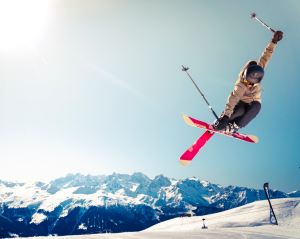
Big air awaits you in Whistler Blackcomb
Now this one is pretty straight forward, but just so we cover all the bases. For skiers, you’re going to need: skis, poles and ski boots. Snowboarders are going to need: snowboard, snowboard boots and bindings.
In Whistler village, the upper village and Creekside you will be able to find a number of rental shops, where you can hire everything you need for a day on the mountain. Some of the stores even rent out ski pants and jackets for the day, so you don’t have to buy them.
For the more advanced riders, you can also find demo stores where you can test run the best skis and snowboards of the season, on the mountain.
You are also not going to get very far, without a lift ticket from the mountain. These lift tickets can be pricey – especially in peak season. If you can book in advance – DO, this will save you some money. There are multiple locations to pick up tickets in the village, upper village and Creekside.
For people staying at the Four Seasons and Fairmont Chateau, there is a mountain ski desk where you can pick up your tickets in the ski concierge. A mountain map is always good to have on hand too, so make sure you grab one of those.
How Fit Do I Need To Be?
There is a certain level of fitness you need to be able to participate in any snowsport. The more physically fit you are, the more you will enjoy the sport. Snowsports also require a good sense of balance.
With that being said many people take up these sports with no preparation involved. Of course, there will be some sore legs along the way, but taking rest breaks is certainly not frowned upon.
If you’re concerned about your fitness, then actually prepare: do some yoga, do some strengthening exercises, do some cardio – basically do all you can to build your strength and endurance.
Snowboarders, especially learners, need to have a reasonable amount of upper body strength as well to be able to push themselves off the floor – so boarders, don’t forget those push-ups!
Skiing and Snowboarding: A Whistler Tradition
Whistler is a skier and snowboarders paradise. You can spend the day with your pals sending it down the mountain, you can spend a day with a mountain ski guide perfecting your sport, you can spend a day in a new world called the backcountry. However you spend your days in Whistler, we don’t think it will take you long to realise that every day is a good day in this town we call home.
